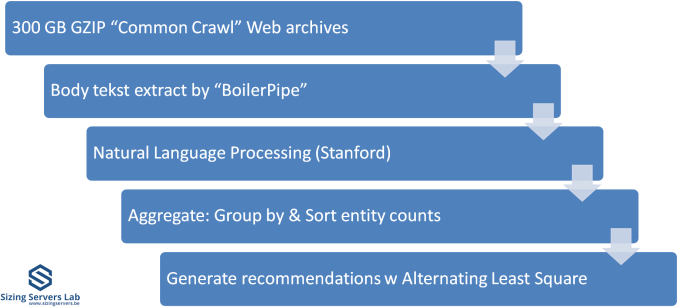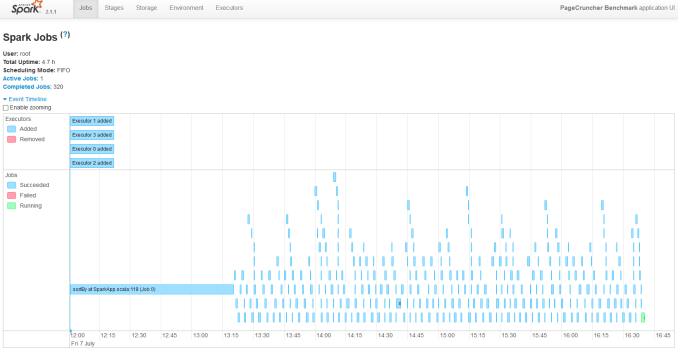Sizing Up Servers: Intel's Skylake-SP Xeon versus AMD's EPYC 7000 - The Server CPU Battle of the Decade?
by Johan De Gelas & Ian Cutress on July 11, 2017 12:15 PM EST- Posted in
- CPUs
- AMD
- Intel
- Xeon
- Enterprise
- Skylake
- Zen
- Naples
- Skylake-SP
- EPYC
Apache Spark 2.1 Benchmarking
Apache Spark is the poster child of Big Data processing. Speeding up Big Data applications is the top priority project at the university lab I work for (Sizing Servers Lab of the University College of West-Flanders), so we produced a benchmark that uses many of the Spark features and is based upon real world usage.
The test is described in the graph above. We first start with 300 GB of compressed data gathered from the CommonCrawl. These compressed files are a large amount of web archives. We decompress the data on the fly to avoid a long wait that is mostly storage related. We then extract the meaningful text data out of the archives by using the Java library "BoilerPipe". Using the Stanford CoreNLP Natural Language Processing Toolkit, we extract entities ("words that mean something") out of the text, and then count which URLs have the highest occurrence of these entities. The Alternating Least Square algorithm is then used to recommend which URLs are the most interesting for a certain subject.
In previous articles, we tested with Spark 1.5 in standalone mode (non-clustered). That worked out well enough, but we saw diminishing returns as core counts went up. In hindsight, just dumping 300 GB of compressed data in one JVM was not optimal for 30+ core systems. The high core counts of the Xeon 8176 and EPYC 7601 caused serious performance issues when we first continued to test this way. The 64 core EPYC 7601 performed like a 16-core Xeon, the Skylake-SP system with 56 cores was hardly better than a 24-core Xeon E5 v4.
So we decided to turn our newest servers into virtual clusters. Our first attempt is to run with 4 executors. Researcher Esli Heyvaert also upgraded our Spark benchmark so it could run on the latest and greatest version: Apache Spark 2.1.1.
Here are the results:

If you wonder who needs such server behemoths besides the people who virtualize a few dozen virtual machines, the answer is Big Data. Big Data crunching has an unsatisfiable hunger for – mostly integer – processing power. Even on our fastest machine, this test needs about 4 hours to finish. It is nothing less than a killer app.
Our Spark benchmark needs about 120 GB of RAM to run. The time spent on storage I/O is negligible. Data processing is very parallel, but the shuffle phases require a lot of memory interaction. The ALS phase does not scale well over many threads, but is less than 4% of the total testing time.
Given the higher clockspeed in lightly threaded and single threaded parts, the faster shuffle phase probably gives the Intel chip an edge of only about 5%.












219 Comments
View All Comments
ddriver - Tuesday, July 11, 2017 - link
Gotta love the "you don't care about the xeon prices" part thou. Now that intel don't have a performance advantage, and their product value at the high end is half that of amd, AT plays the "intel is the better brand" card. So expected...OZRN - Wednesday, July 12, 2017 - link
You need some perspective. Database licensing for Oracle happens per core, where Intel's performance is frequently better in a straight line and since they achieve it on lower core count it's actually better value for the use case. Higher per-CPU cost is not so much of a concern when you pay twice as much for a processor license to cover those cores.I'm an AMD fan and I made this account just for you, sweetheart, but don't blind yourself to the truth just because Intel has a history of shady business. In most regards this is a balanced review, and where it isn't, they tell you why it might not be. Chill out.
ddriver - Thursday, July 13, 2017 - link
You are such a clown. Nobody, I repeat, NOBODY on this planet uses 64 core 128 thread 512 gigabytes of ram servers to run a few MB worth of database. You telling me to get pespective thus can mean only two things, that you are a buthurt intel fanboy troll or that you are in serious need of head examination. Or maybe even both. At any rate, that perfectly explains your ridiculously low standards for "balanced review".Notmyusualid - Friday, July 14, 2017 - link
It seems no matter what opinion someone presents that might exhibit Intel in a better light - you are going to hate it anyway.What a life you must lead.
OZRN - Friday, July 14, 2017 - link
No, they don't. They use them to host gigabytes to terabytes worth of mission critical databases, with specified amounts of cores dedicated to seperate environments of hard partitioned data manipulation. I've done some quick math for you and in an average setup of Enterprise Edition of Oracle DB, with only the usually reported options and extras, this type of database would cost over $3.7m to run on *64 cores alone*. At this point, where is your hardware sunk costs argument?Also, I don't think anyone here is impressed by your ability to immediately personally insult people making valid points. Good luck finding your head that deep in your colon.
CajunArson - Tuesday, July 11, 2017 - link
"All of our testing was conducted on Ubuntu Server "Xenial" 16.04.2 LTS (Linux kernel 4.4.0 64 bit). The compiler that ships with this distribution is GCC 5.4.0."I'd recommend using a more updated distro and especially a more up to date compiler (GCC 5.4 is only a bug-fix release of a compiler from *2015*) if you want to see what these parts are truly capable of.
Phoronix does heavy-duty Linux reviews and got some major performance boosts on the i9 7900X simply by using up to date distros: http://www.phoronix.com/scan.php?page=article&...
Considering that Purley is just an upscaled version of the i9 7900X, I wouldn't be surprised to see different results.
CajunArson - Tuesday, July 11, 2017 - link
As a followup to my earlier comment, that Phoronix story, for example, shows a speedup factor of almost 5X on the C-ray benchmark simply by using a modern distro with some tuning for the more modern Skylake architecture.I'm not saying Purley would have a 5X speedup on C-ray per-say, but I'd be shocked if it didn't get a good boost using modern software that's actually designed for the Skylake architecture.
CoachAub - Wednesday, July 12, 2017 - link
Keywords: "actually designed for the Skylake architecture". Will there be optimizations for AMD Epyc chips?mkozakewich - Friday, July 14, 2017 - link
If it's a reasonable optimization, it makes sense to include it in the benchmark. If I were building these systems, I'd want to see benchmarks that resembled as closely as possible my company's workflow. (Which may be for older software or newer software; neither are inherently more relevant, though benchmarks on newer software will usually be relevant further into the future.)CajunArson - Tuesday, July 11, 2017 - link
And another followup: The time kernel compilation on the i9 7900X got almost a factor of 2 speedup over the Ubuntu 16.04 using more modern distros.